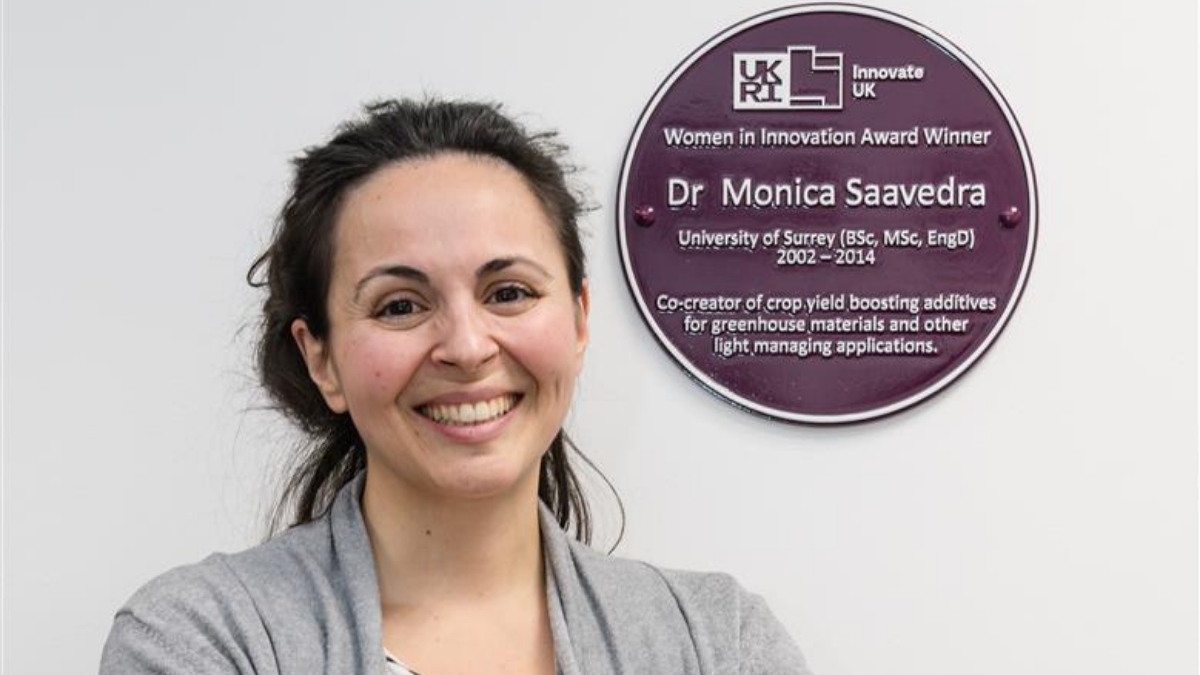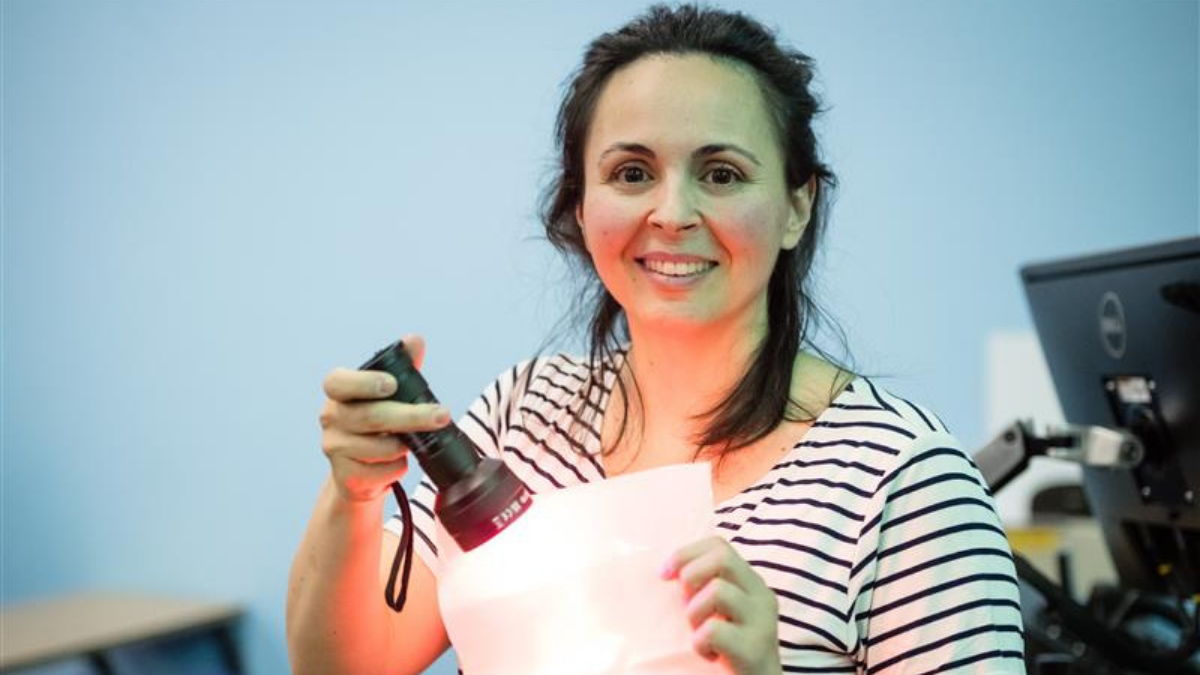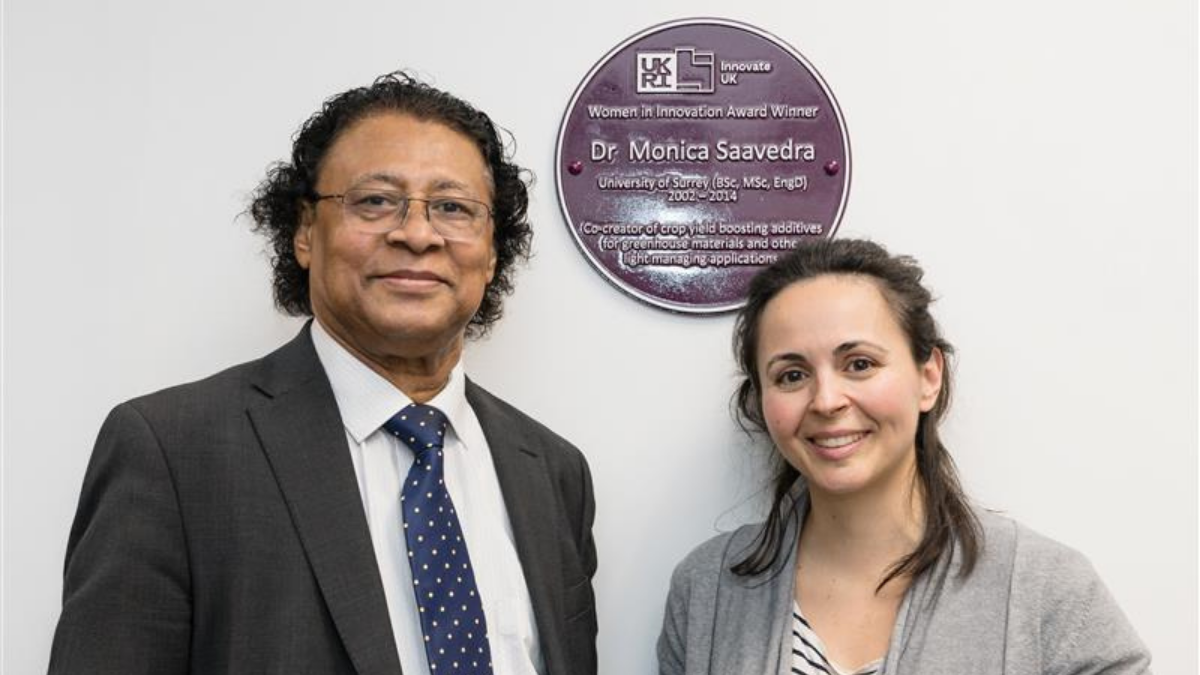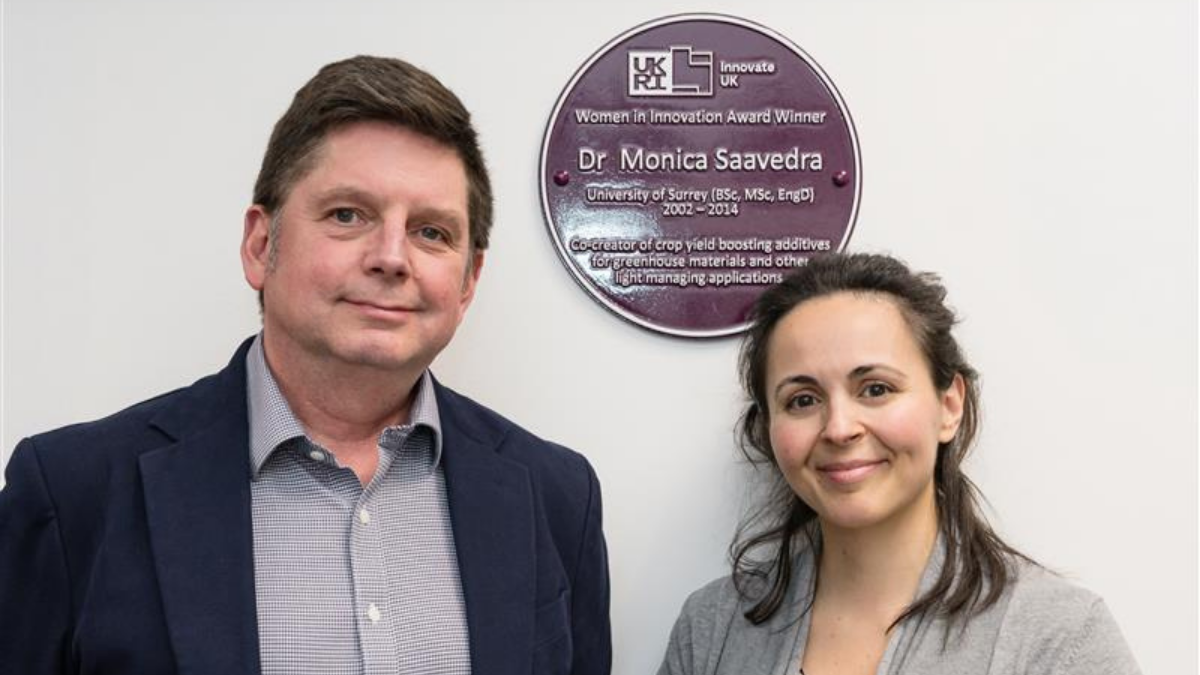My Graduate Story: Dr Monica Saavedra
When Dr Monica Saavedra (EngD Micro- and Nano-Materials & Technologies, 2014) stepped back into the Faculty of Engineering and Physical Sciences this week to unveil her Innovate UK Women in Innovation purple plaque, it marked more than a career milestone.

Monica Saavedra pictured beside her newly unveiled purple plaque.
Monica’s journey began far from any physics laboratory: raised by her grandmother, growing up amid instability, learning to read at the age of eight. The plaque now serves as a permanent marker of an alumna whose ideas are changing how the world grows food. She chose to place the plaque at the University “because Surrey marks pivotal points in my journey as a scientist and entrepreneur,” she says.
Early life
Monica was born in Denmark and spent much of her childhood in Bari, Italy. Money was tight; books were rare. With violent crime and organised criminal activity, a visible backdrop, her family stayed indoors for safety. “We were between four walls most of the time.” School was a struggle, not least because no one spotted how far behind she was, but in part because her own family told her she couldn’t do maths – and she believed them. “I only started to read at age eight because nobody noticed that I couldn’t.”
School was often a place of humiliation. “Most teachers didn't support me, and in some cases berated me in front of my entire class”. Yet a few saw her potential – art and literature teachers. “A handful were kind. They didn’t know my circumstances, but their belief – even quiet, even small – mattered.”
That early thread of encouragement helped Monica stay curious enough to keep going. “I didn’t believe in myself at all. But I’ve always had stubbornness. If something’s worthwhile, I keep at it.”
Finding calm (and a calling) at Surrey
Monica’s first visit to campus as a prospective Physics student was a world away from her early years and she immediately felt at home. “Beauty and calm,” she recalls. “I’m the type of person who needs that calm – the lake, the green space – and Surrey’s Physics was ranked so highly. I was impressed.”
She stayed for the long haul, completing a Bachelor of Science degree in Physics, a Master of Science degree in Nanotechnology & Nanoelectronic Devices, and an Engineering Doctorate with the National Physical Laboratory. What kept her here? “I went with the flow then – I’m the opposite now – but Surrey kept offering the right next challenge.” A summer placement in the Physics lab with Dr Alan Dalton and Dr Izabela Jurewicz proved decisive: “Hands on in the lab, making carbon-nanotube radiation detectors and seeing them work – that was the dopamine hit. I fell in love with nanotech and with making.”
During her MSc, a best-student award lit a fire. “That course connected theory to practice. I kept scribbling ‘what ifs’ in the margins. One idea was using quantum dots to change the light spectrum in solar cells. I didn’t know it yet, but that curiosity was the seed of Lambda Agri.”
From batteries and biotech to a mission in advanced materials
Monica’s early career zig-zagged through deep-tech roles: silicon anodes for EV batteries in Oxfordshire; then microfluidics and DNA sequencing in Cambridge. “The biotech work was exciting – but incredibly wasteful. Bins full of plastics and glass every day. Watching that built my interest in sustainability.”
A move into solar-cell research and development followed, but Monica was itching to build something that could reach market faster. “I’d had this spectral-tuning idea since my MSc. We revisited the landscape years later – fewer competitors, better materials – and decided to start up.”

Monica demonstrating Lambda’s retrofittable active spray coating technology
Lambda Agri: better light for plants, no plug required
Monica is now CEO of Lambda Agri, the company she co-founded to help growers produce more food with less energy. Lambda’s technology is an active, retrofittable spray coating for greenhouses that converts part of the sun’s spectrum – shifting ultraviolet into photosynthetically active red light – so plants get “more of the light they use,” without electricity. In trials and demonstrations, this kind of spectral conversion and diffusion has been shown to boost growth and extend seasons; Innovate UK highlighted Monica’s insight that even 1% more light can mean roughly 1% more yield. “We’re striving to feed the world sustainably,” she says.
The vision is elegantly simple: use materials science to make sunlight work harder for crops. “Food takes a lot of energy to grow. If we can deliver more usable light passively, we reduce costs and carbon while protecting yields as weather gets less predictable.”
A plaque, a platform – and what Surrey made possible
Monica is also a SurreyLeader, Surrey’s alumni network bringing together an international group of peers excelling in their fields. The programme provides personal development opportunities including masterclasses, workshops and University events. “Surrey connected my curiosity to purpose,” she says. “During my MSc I realised I could aim higher. Later, one of those ‘distracting’ lecture ideas became Lambda.”
Receiving the purple plaque from Innovate UK is personal. “I support purple plaques because blue plaques are almost entirely male-dominated.” she says. Innovate UK’s campaign celebrates Women in Innovation Award winners and puts their stories where the next generation can see them.
At the unveiling, Monica thanked the academics who helped shape her path: Professors Joseph Keddie, Paul Sellin and Ravi Silva.
The reality of leading a deep-tech start-up
Ask Monica how a “typical day” looks, and she laughs. “There isn’t one. I’m a chameleon: marketer, grant-writer, recruiter, fundraiser. I dream of glowing greenhouses.”
The hardest part? Funding. “Advanced materials is seen as long time to market, low return on investment. If most founders must meet 100 investors, we meet 200. As a solo female founder in deep hardware, you’re swimming against the current – but the mission keeps me going.”
Resilience, she says, is part strategy, part stubbornness and her love of gaming comes in handy: “I treat problems like a game of probabilities. Forecast the landscape, pre-empt the risks, and keep moving. Since becoming CEO, that mindset – and a brilliant, committed team – has saved the company more than once.”
“Since my mother retired, she’s become my best investor – not with money, but with her time and energy. She helps care for my children and often drives me to meetings, with the baby thankfully asleep in the car. I couldn’t do what I do without her, and I’m deeply grateful.”
Advice for students: start where influence starts
Monica’s guidance for those eyeing sustainability and advanced materials might surprise you: “By all means dive into science – the world needs you. But if you want impact in food and climate, don’t overlook policy. Smart policy unlocks markets for sustainable products and helps price carbon meaningfully. Influence the system, then build within it.”
To women in STEM, especially those second-guessing themselves: “Say your idea out loud. I used to think everyone else knew better. Then I watched people voice the exact thoughts I’d kept to myself. Confidence grows when you contribute – and you realise you belong.”
Monica hopes her plaque becomes a conversation starter. “If one student stops, reads it, and thinks, maybe I could do that, then it’s doing its job,” she says. “Because talent is everywhere – opportunity isn’t. I started without privilege and without confidence. Grit, mentors and a university that linked theory to practice changed my trajectory.”

